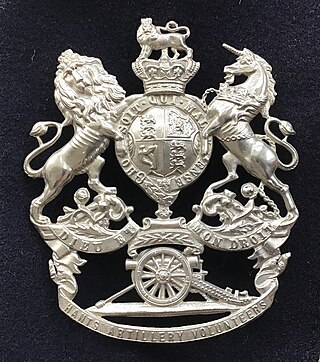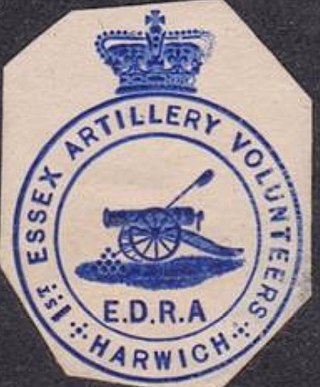
The 1st Wessex Artillery was a volunteer unit of the British Army that existed under various titles from 1860 to 1971, including active service in Mesopotamia in World War I and North Africa and Italy in World War II.

56th (Cornwall) Heavy Anti-Aircraft Regiment, Royal Artillery was a volunteer air defence regiment of Britain's Territorial Army (TA). Originally raised in 1920 as a medium artillery regiment, it was converted to the anti-aircraft role in 1932. During the Second World War, it was employed in Home Defence, in Iceland and then in India, where it was temporarily converted back to medium artillery. Postwar, it reverted to air defence until disbandment in 1955.

The 1st Essex Artillery Volunteers was a unit of Britain's part-time auxiliary forces raised in Essex in 1860 in response to an invasion scare. It served under various designations as field artillery in Palestine during World War I. During World War II its units served as mountain artillery in Italy and as jungle artillery and medium artillery in Burma. Postwar it became an airborne unit until it was merged with other units in the 1950s.

The 1st Norfolk Artillery Volunteers was a unit of Britain's Volunteer Force raised in the County of Norfolk in 1859 as a response to a French invasion threat. It became part of the Territorial Force in 1908 and served under various designations as field artillery in Palestine during World War I, and as heavy anti-aircraft artillery in North Africa and Italy during World War II. It disappeared in a merger in 1955.
The 1st Kent Artillery Volunteers was a part-time unit of the British Army's Royal Artillery from 1860 to 1956. Primarily serving as coastal artillery defending the Port of Dover and other harbours in South-East England, the unit's successors also served in the heavy artillery role on the Western Front during World War I and as anti-aircraft artillery during the Blitz and later in the North African and Italian campaigns of World War II.

The 1st East Yorkshire Artillery Volunteers was a part-time unit of Britain's Royal Artillery based in the East Riding of Yorkshire, which also contained sub-units from the North and West Ridings. Created during an invasion scare in 1859–1860, it survived to supply units to the later Territorial Force of the 20th century.

The Pembroke Royal Garrison Artillery was a part-time unit of the British Army that defended the coast of West Wales during both world wars. Although it never saw action in its coastal defence role, it manned a number of siege batteries of heavy howitzers for service on the Western Front and Italian Front in World War I.

The 1st Lancashire Artillery Volunteers, popularly known as 'Brown's Corps', was an auxiliary unit of the British Army raised in Liverpool in 1859. As the Lancashire & Cheshire Royal Garrison Artillery in the Territorial Force it was responsible for defending the Mersey Estuary and the coastline of North West England. It was one of the few coast defence units to fire a shot during World War I but also provided personnel for a number of siege batteries that saw action on the Western Front. It continued in the coast defence role during World War II, at the end of which it sent troops to work in the rear areas in Europe. It was reformed postwar but was broken up when the coast artillery branch was abolished in 1956.

The Northern Division, Royal Artillery, was an administrative grouping of garrison units of the Royal Artillery, Artillery Militia and Artillery Volunteers within the British Army's Northern District from 1882 to 1889.

The Lancashire Division, Royal Artillery, was an administrative grouping of garrison units of the Royal Artillery, Artillery Militia and Artillery Volunteers within the British Army's Northern District from 1882 to 1889.

The Cinque Ports Division, Royal Artillery was an administrative grouping of garrison units of the Royal Artillery, Artillery Militia and Artillery Volunteers within the British Army's South Eastern District from 1882 to 1889.

The London Division, Royal Artillery, was an administrative grouping of garrison units of the Royal Artillery and Artillery Volunteers within the British Army's Home and Woolwich Districts from 1882 to 1889.

The Scottish Division, Royal Artillery, was an administrative grouping of garrison units of the Royal Artillery, Artillery Militia and Artillery Volunteers within the British Army's Scottish District from 1882 to 1889.

The North Irish Division, Royal Artillery, was an administrative grouping of garrison units of the Royal Artillery and Artillery Militia in Ireland from 1882 to 1889.

The South Irish Division, Royal Artillery, was an administrative grouping of garrison units of the Royal Artillery and Artillery Militia in Ireland from 1882 to 1889.

The Eastern Division, Royal Artillery, was an administrative grouping of garrison units of the Royal Artillery, Artillery Militia and Artillery Volunteers within the British Army's Eastern District from 1882 to 1902.

The Southern Division, Royal Artillery, was an administrative grouping of garrison units of the Royal Artillery, Artillery Militia and Artillery Volunteers within the British Army's Southern District from 1882 to 1902.

The Western Division, Royal Artillery, was an administrative grouping of garrison units of the Royal Artillery, Artillery Militia and Artillery Volunteers within the British Army's Western District from 1882 to 1902.

The Mountain Division, Royal Artillery, was an administrative grouping of mountain artillery units of the Royal Artillery from 1889. It continued as a distinct branch of the Royal Garrison Artillery until World War I.







